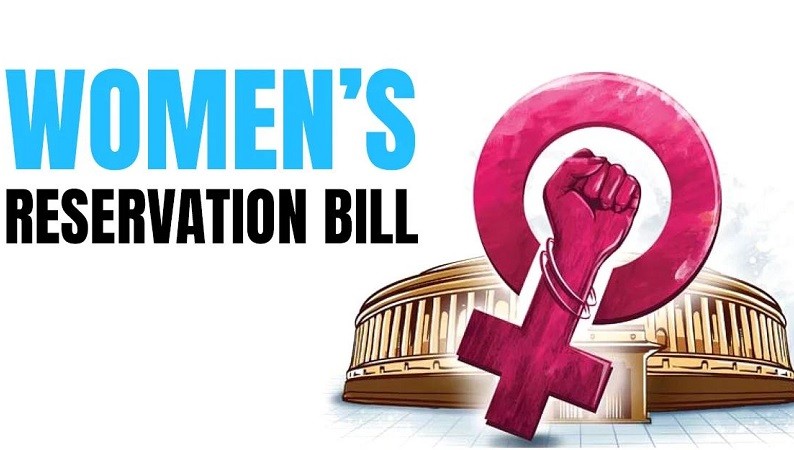
New Delhi: In a significant stride towards granting women a rightful place in the Lok Sabha and other elected assemblies, the Modi-led Central government is poised to present a groundbreaking bill in the Lok Sabha this Tuesday. The bill, known as the Constitution (One Hundred and Twenty-Eighth Amendment) Bill, 2023, will be introduced by Union Minister of Law and Justice, Arjun Ram Meghwal, in the Lok Sabha.
Here is the complete text of The Constitution (One Hundred and Twenty-Eighth Amendment) Bill, 2023:
1. Title and Commencement:
(a) If ratified by Parliament, this legislation shall be referred to as the Constitution (One Hundred and Twenty-Eighth Amendment) Act, 2023.
(b) It shall come into effect on the date designated by the Central Government through notification in the Official Gazette.
2. Amendment to Article 239AA:
In Article 239AA of the Constitution, in clause (2), the following provisions shall be inserted:
Seats shall be reserved for women in the Legislative Assembly of the National Capital Territory of Delhi.
Approximately one-third of the seats reserved for the Scheduled Castes in the Legislative Assembly of the National Capital Territory of Delhi shall be reserved for women.
Approximately one-third of the total number of seats to be filled by direct election in the Legislative Assembly of the National Capital Territory of Delhi (including seats reserved for women from the Scheduled Castes) shall be reserved for women as determined by Parliament through legislation.
3. Insertion of Article 330A:
After Article 330 of the Constitution, the following article shall be added:
Seats shall be reserved for women in the House of the People (Lok Sabha).
Approximately one-third of the total seats reserved under clause (2) of Article 330 shall be reserved for women from the Scheduled Castes or the Scheduled Tribes.
Approximately one-third of the total seats to be filled by direct election to the House of the People shall be reserved for women.
4. Insertion of Article 332A:
After Article 332 of the Constitution, the following article shall be added:
Seats shall be reserved for women in the Legislative Assembly of every State.
Approximately one-third of the total seats reserved under clause (3) of Article 332 shall be reserved for women from the Scheduled Castes or the Scheduled Tribes.
Approximately one-third of the total seats to be filled by direct election in the Legislative Assembly of every State shall be reserved for women.
5. Insertion of Article 334A:
Notwithstanding any provisions in preceding parts, the reservation of seats for women in the House of the People, the Legislative Assembly of a State, and the Legislative Assembly of the National Capital Territory of Delhi shall become effective after a delimitation exercise is conducted following the publication of relevant figures from the first census after the enactment of the Constitution (One Hundred and Twenty-Eighth Amendment) Act, 2023. These provisions shall expire after fifteen years from such commencement.
Seats reserved for women in these legislative bodies, as mentioned above, shall continue until determined otherwise by Parliament through legislation after each subsequent delimitation exercise.
These provisions shall not affect existing representation in the House of the People, the Legislative Assembly of a State, or the Legislative Assembly of the National Capital Territory of Delhi until the dissolution of the respective legislative bodies.
6. Transitional Provisions:
The amendments made to the Constitution by the Constitution (One Hundred and Twenty-Eighth Amendment) Act, 2023, shall not impact existing representation in the House of the People, the Legislative Assembly of a State, or the Legislative Assembly of the National Capital Territory of Delhi until the dissolution of the relevant legislative body in existence at the commencement of the said Act.
Statement of Objects and Reasons:
After celebrating 75 years of Independence, our nation embarks on the Amritkal era, aspiring to become a 'Vikasit Bharat' by 2047. Achieving this goal necessitates the collective effort of all segments of society, under the banner of "Sabka Saath, Sabka Vikas, Sabka Vishwas, Sabka Prayas." The role of women, constituting half the population, is pivotal in realizing this vision.
The government has taken numerous measures to empower women and promote women-led development, resulting in significant strides towards financial independence, equal access to education, and healthcare. Initiatives such as Ujjawala Yojana, Swacch Bharat Mission, Mudra Yojna, among others, have enhanced the quality of life, especially for women. However, true empowerment requires greater participation in the decision-making process, enriching legislative debates with diverse perspectives.
While women's representation in Panchayat Raj institutions and municipal bodies is substantial, it remains limited in State Legislatures and Parliament. The long-standing demand for women's reservation in the Lok Sabha and State Legislative Assemblies has been acknowledged. Previous attempts, including the 2010 Bill passed by the Rajya Sabha, were unable to gain traction in the Lok Sabha.
To facilitate increased women's participation in policymaking at the State and national levels, a new legislation is proposed, amending the Constitution to reserve approximately one-third of seats in the House of the People, every State legislative assembly, and the Legislative Assembly of the National Capital Territory of Delhi for women.
Financial Memorandum:
The enactment of this Bill is not anticipated to incur any expenditure, either recurrent or non-recurrent, from the Consolidated Fund of India.